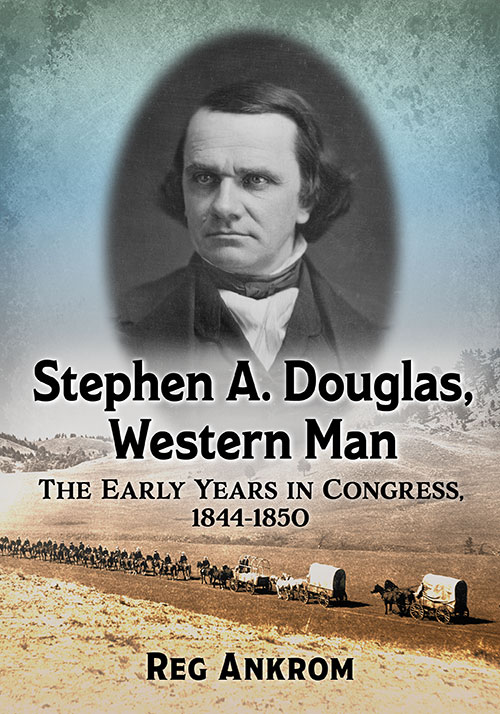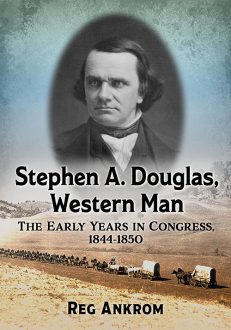Stephen A. Douglas, Western Man
The Early Years in Congress, 1844-1850
$49.95
In stock
About the Book
It didn’t take long for freshman Congressman Stephen A. Douglas to see the truth of Senator Thomas Hart Benton’s warning: slavery attached itself to every measure that came before the U.S. Congress. Douglas wanted to expand the nation into an ocean-bound republic. Yet slavery and the violent conflicts it stirred always interfered, as it did in 1844 with his first bill to organize Nebraska. In 1848, when America acquired 550,000 square miles after the Mexican War, the fight began over whether the territory would be free or slave. Henry Clay, a slave owner who favored gradual emancipation, packaged territorial bills from Douglas’s committee with four others. But Clay’s “Omnibus Bill” failed. Exhausted, he left the Senate, leaving Douglas in control. Within two weeks, Douglas won passage of all eight bills, and President Millard Fillmore signed the Compromise of 1850. It was Douglas’s greatest legislative achievement. This book, a sequel to the author’s Stephen A. Douglas: The Political Apprenticeship, 1833–1843, fully details Douglas’s early congressional career. The text chronicles how Douglas moved the issue of slavery from Congress to the ballot box.
About the Author(s)
Bibliographic Details
Reg Ankrom
Format: softcover (7 x 10)
Pages: 379
Bibliographic Info: 12 photos, appendices, notes, bibliography, index
Copyright Date: 2021
pISBN: 978-1-4766-7376-9
eISBN: 978-1-4766-4228-4
Imprint: McFarland
Table of Contents
Acknowledgments xi
Prologue 1
Part One
1. “I am a Western man” 6
2. Douglas Runs for Congress 13
3. U.S. Representative Stephen A. Douglas of Illinois 18
4. “This chrysalis state, between worm and butterfly” 26
5. “Steam engine in breeches” 35
6. Public Works 45
7. Manifest Destiny: “Ah, the discomforts” 49
8. When Is Enough Enough? 55
9. Re-Election and Re-Annexation 61
10. Simplify, Simplify: Douglas Gets Texas 68
11. Douglas and “Squatter Sovereignty” 74
12. Climate, Soil, Productions 77
Part Two
13. The American Claim on Oregon 86
14. Why Oregon? 91
15. “Enthusiasms of pearly youth” 96
16. Friends and Foes 104
17. “Notice will be given” 110
18. Douglas Does His Homework 117
19. “A lion in the way” 122
20. “The whole of Oregon is ours” 127
21. Elevating the Level of Statesmanship 133
22. The Surprising Pre-Emption of Wilmot 138
23. Senator Stephen A. Douglas 144
24. Rumors of War 147
25. Polk: “…War exists” 153
26. Douglas Seeks a Military Commission 159
27. Wilmot Creates a Southwestern Earthquake 166
28. Wilmot and a Challenge to Lead 174
29. Free Soil. Free Labor. For Free White Men 178
30. Advancement 183
31. Oregon—Free or Slave? 189
32. Weighing Wilmot and the Missouri Compromise 194
33. The Long Lament of John C. Calhoun 199
34. Douglas, the West, and Rails 209
35. Encountering Slavery 213
36. Southern Fears 220
37. Having It Both Ways: Federal Protection 226
Part Three
38. A Principle for Compromise 232
39. Death of a President 238
40. Golden California 242
41. Missouri 245
42. “Young America” 255
43. “California, do it yourself” 260
44. Henry Clay Going and Coming 265
45. Triumvirates Major and Minor 269
46. “A higher law” 273
47. “Fraud elected a president and senator” 277
48. Douglas Warns the South: Freedom Is Inevitable 282
49. Compromising Without Compromising 285
50. Groundwork for Compromise 290
51. Clay: “Tranquility reigns” 293
52. The Omnibus’s Wheels Come Off 297
53. The Rise of the Douglas Bills 302
54. Fugitives and Trade 308
55. Taking It to the House 313
56. Villain or Victor? 318
Epilogue 323
Appendix A: Resolution of the Chicago Common Council Adopted October 21, 1850 325
Appendix B: Douglas Resolutions at Chicago Meeting, Adopted October 23, 1850 326
Chapter Notes 327
Bibliography 351
Index 359
Book Reviews & Awards
• Winner, Best of Illinois History award—Illinois State Historical Society
• “Valuable material that will be of interest to Civil War buffs, Illinois history aficionados, and academic historians.”—Civil War Book Review
• “In this second volume, gifted biographer Reg Ankrom chronicles the rise of the able, ambitious Douglas, who arrived in Washington at the age of thirty-one and quickly gained fame as an eloquent critic of the free soil movement and became one of the key architects of the Compromise of 1850. Elegantly written and deeply researched, Ankrom’s meticulously textured volumes will long stand as the definitive life of Douglas.”—Douglas R. Egerton, author of Year of Meteors: Stephen Douglas, Abraham Lincoln, and the Election That Brought on the Civil War
• “An engrossing biography of one of the central actors in the drama of antebellum politics. Paints a vivid portrait that faithfully chronicles the strengths and flaws of this nineteenth century titan and nemesis of Abraham Lincoln. This volume enriches and deepens our understanding of the man and his times with lush details and terse prose. It is at once a concise history and biography that begins with Douglas’s founding of the Democratic Party in Illinois and culminates with the Compromise of 1850, a pivotal moment that marked the end of the Great Triumvirate of Webster, Clay, and Calhoun and the emergence of the next generation of leaders who would fight the Civil War.”—Joseph R. Fornieri, author of Abraham Lincoln, Philosopher Statesman and director of the Center of Statesmanship, Law and Liberty at the Rochester Institute of Technology
• “Reg Ankrom has thought long and deeply about Stephen Douglas, that supremely talented and sometimes maddeningly complex man. Ankrom’s study offers a richly contextualized, thorough examination of Douglas’ early years as an ambitious western man-on-the-make, and his meteoric rise to prominence in Illinois and national politics. Well-written, impressively researched and carefully rooted in Ankrom’s deep knowledge of the era, this book is a must-have for any serious student of American antebellum politics.”—Brian Dirck, Anderson University, author of The Black Heavens: Abraham Lincoln and Death





